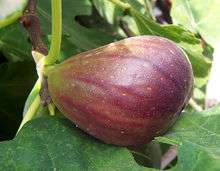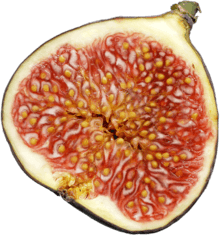fig
English


Pronunciation
- IPA(key): /fɪɡ/
Audio (US) (file) - Rhymes: -ɪɡ
Etymology 1
From Middle English fige, fygge (also fyke, from Old English fīc, see fike), borrowed from Anglo-Norman figue, borrowed from Old French figue, from Old Occitan figa, from Vulgar Latin *fīca (“fig”), from Latin fīcus (“fig tree”), from a pre-Indo European language, perhaps Phoenician 𐤐𐤂 (pagh, literally “ripe fig”) (compare Biblical Hebrew פַּגָּה (paggâ, “early fallen fig”), Classical Syriac ܦܓܐ (paggāʾ), dialectal Arabic فَجّ (fajj), فِجّ (fijj))[1]. (Another Semitic root (compare Akkadian 𒈠 (tīʾu, literally “fig”)) was borrowed into Ancient Greek as σῦκον (sûkon) (Boeotian τῦκον (tûkon)) and Armenian as թուզ (tʿuz); whence English sycophant.) The soap-making sense derives from the resemblance of the granulations in and texture of the soap to those of a fig.
Noun
fig (plural figs)
- A fruit-bearing tree or shrub of the genus Ficus that is native mainly to the tropics.
- 1611, King James Version, Genesis 3:7:
- And the eyes of them both were opened, and they knew that they were naked; and they sewed fig leaves together, and made themselves aprons.
- 1611, King James Version, Genesis 3:7:
- The fruit of the fig tree, pear-shaped and containing many small seeds.
- A small piece of tobacco.
- The value of a fig, practically nothing; a fico; a whit.
- 1591, William Shakespeare, Henry VI, Part 2, Act II, sc. 3:
- I'll pledge you all; and a fig for Peter!
- 1848, William Makepeace Thackeray, Vanity Fair, Chapter 6:
- About Rebecca and Jos he did not care a fig.
- 2004, David Mitchell, Cloud Atlas
- J. senses the entente between Eva and me and doesn't like it one fig.
- 1591, William Shakespeare, Henry VI, Part 2, Act II, sc. 3:
Translations
|
|
|
|
Verb
fig (third-person singular simple present figs, present participle figging, simple past and past participle figged)
- (obsolete) To insult with a fico, or contemptuous motion.
- Shakespeare
- When Pistol lies, do this, and fig me like / The bragging Spaniard.
- Shakespeare
- (obsolete) To put into the head of, as something useless or contemptible.
- (Can we find and add a quotation of L'Estrange to this entry?)
- (soap-making, dated) To develop, or cause (a soap) to develop, white streaks or granulations. [mid-1800s to mid-1900s]
- 1893, Henry Gathmann, American Soaps, page 204:
- For filling figged soaps silicate of potash is best adapted, as soda prevents in a measure the proper crystallization. [...] Artificially figged soap [...makes] a very close imitation of the naturally figged soap.
- 1897, The National Provisioner, page 27:
- Figging is usually considered to indicate a good quality of soft soap, but such is really not the case. A first-class soft soap can be made which will not fig, while, on the other hand, a poor soap can be produced which will fig.
- 1938, Harry Bennett, The Standard Book of Formulas:
- In the cold soaps, the water soluble color is added in liquid form after saponification has started. In figged soaps, the color is crutched in after saponification is completed.
- 1893, Henry Gathmann, American Soaps, page 204:
Further reading
Etymology 2
Variation of fike.
Verb
fig (third-person singular simple present figs, present participle figging, simple past and past participle figged)
Derived terms
Etymology 3
Noun
fig (plural figs)
- Abbreviation of figure. (diagram or illustration)
- (colloquial, dated) A person's figure; dress or appearance.
Alternative forms
- (abbreviation): fig.
Verb
fig (third-person singular simple present figs, present participle figging, simple past and past participle figged)
- (colloquial, dated, transitive) To dress; to get oneself up a certain way.
Related terms
Etymology 4
See figging.
Verb
fig (third-person singular simple present figs, present participle figging, simple past and past participle figged)
- (rare) To insert a ginger root into the anus, vagina or urethra of: to perform figging upon.
- 1874, The Slang Dictionary: Etymological, Historical, and Anecdotal, page 176:
- Ginger, a showy, fast horse — as if he had been figged with ginger under his tail; a red-haired man.
- 1901, Natal Agriculture Journal, page 744:
- He must be "figged." Figging consists in pushing a piece of crushed ginger into the return of the wretched creature — a practice which is now illegal, and of which information should be given to the R.S.P.C.A. whenever detected.
- 2015, Becky Lower, The Cotillion Ball Saga, Simon and Schuster (→ISBN):
- “Is something amiss with the horse, Parr?” His gaze left the horse for a second as he glanced at Grace. “Yes, the horse has been figged. Now I just need to figure out who the culprit is.”
- 1874, The Slang Dictionary: Etymological, Historical, and Anecdotal, page 176:
References
- Andreas Franz and Wilhelm Schimper, Plant Geography Upon a Physiological Basis, volume 2 (Berlin: Gebrüder Borntraeger, 1902), page 100